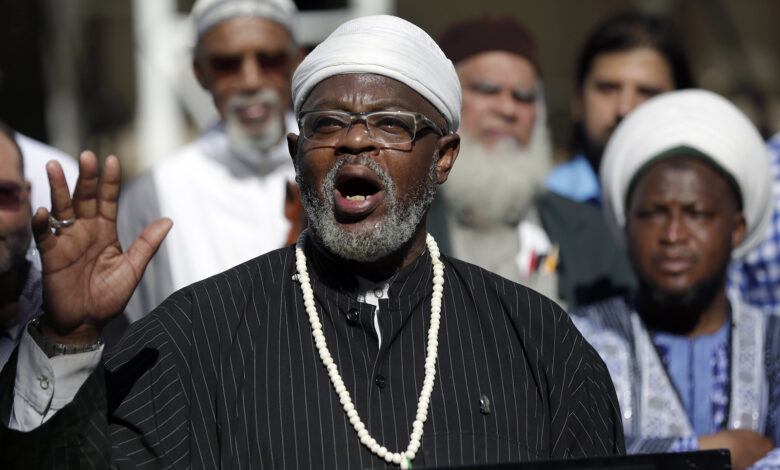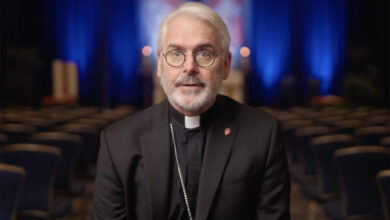
(RNS) — Imam Al-Hajj Talib Abdur-Rashid, the longtime leader of the Mosque of Islamic Brotherhood in Harlem and a pillar of the African American Muslim community in New York City and beyond, has died at 74.
Abdur-Rashid, or Imam Talib, as he was known to his community and to Muslims across the country, died Saturday (Nov. 15) in Harlem. No cause of death has been announced.
“It is with a heavy heart that we inform you that our beloved Imam, Imam Talib Abdur-Rashid has returned to Allah,” the Mosque of Islamic Brotherhood, where Abdur-Rashid served as senior imam since 1989, posted on Facebook Saturday.
He was buried at Rosedale Cemetery in New Jersey on Monday, following a funeral prayer at the Masjid Malcom Shabazz in Harlem.
New York City Mayor-elect Zohran Mamdani said at the funeral prayer Monday morning that Abdur-Rashid was a mentor who encouraged Mamdani to embrace his Muslim faith and use it “to deliver positive change and justice.”
“He made clear that there was no contradiction, no matter how often or how loudly he heard it, between being proud of your faith and being proud to be a New Yorker,” Mamdani said.
The Mosque of Islamic Brotherhood, which Abdur-Rashid described as “a congregation born out of a spirit of resistance,” is Harlem’s oldest Sunni orthodox mosque and traces its roots to El-Hajj Malik Shabazz (Malcolm X). The mosque was both a hub and sanctuary for its predominantly African American congregation, who felt the pressure of being both Muslim and Black in New York City.
Many saw Abdur-Rashid, a champion of social justice, as a direct descendant of the revolutionary Black Muslim leader Malcolm X, whom Abdur-Rashid often honored in his sermons and protests.
“He moved with a deep, deep sense of passion and respect and empathy for those who were confronting any type of struggle,” said Rami Nashashibi, executive director of the Inner-City Muslim Action Network (IMAN). “Imam Talib was the real authentic continuity of Malcolm’s tradition, and as such, he was loved and respected across the country.”
A longtime advocate for police reform and a critic of NYPD’s surveillance of Muslim communities, Abdur-Rashid advocated for victims of police brutality and protested unjust sentencing. He also served as a chaplain at Sing Sing Correctional Facility and other New York prisons, counseled Muslims affected by AIDS and domestic violence, and worked with interfaith organizations, political organizers and elected officials.
“His spirituality and his commitment to justice were intertwined in a really profound way,” said Rasul Miller, a historian and student of Abdur-Rashid. “Nobody had the kind of sharp political analysis and that clear, well- articulated, unapologetic commitment to justice that he had.”
Abdur-Rashid also worked to bridge the divides between African American Muslims and immigrant Muslims through local relationships and national coalitions.
He was also the president emeritus, or ameer, of the Islamic Leadership Council of Metropolitan New York and the vice president, or deputy ameer, of the Muslim Alliance in North America. In 2019, he joined the advisory board of CAIR, the Council on American-Islamic Relations.
At Monday’s janaza, the Islamic funeral prayer, Zaid Shakir, a prominent American Muslim scholar, described Abdur-Rashid as a giant in a long legacy of faithful Black Americans struggling for justice, calling him “the most spiritually rich person I have ever met.”
Even as he grew physically weaker in recent years, Shakir said Abdur-Rashid “didn’t lose his passion for assisting, being that helping hand, to be that shoulder everybody could lean on, to be that back that could hold up under the strains, the weight and the pressures of living in probably one of the most pressurized cities on the face of the Earth. That was Imam Talib, he was a mountain of life.”
RELATED: Inside Zohran Mamdani’s bid to win over religious New Yorkers
Abdur-Rashid was born in Greensboro, North Carolina, in 1951 at a time marked by social and legal segregation in the American South. He was raised Baptist and moved to the South Bronx with his family as a child where he was shaped by Black liberation activism and the Black Arts Movement.
He became interested in Islam after reading the autobiography of Malcolm X, he told Amsterdam News. He visited the Mosque of Islamic Brotherhood for the first time in 1971 and became Muslim at age 20. Abdur-Rashid studied the foundations of Islam from MIB founder Shaykh Allama Al-Hajj Ahmad Tawfiq and Imam Sayed Abdus-Salaam. He was an active member of the mosque and, by 1975, was serving as its assistant imam and the editor of its newspaper, The Western Sunrise.
Drawing on his past as an actor and dancer before becoming an imam, Abdur-Rashid brought cultural and spiritual communities together. He mentored Muslim artists such as Puerto Rican break dancer Jorge “Popmaster” Fabel and rapper Yasiin Bey, earning him the affectionate title of “the hip-hop Imam.”
He was also a prominent part of artist retreats hosted by IMAN in Chicago, in which he “seamlessly” connected the Muslim tradition to artistic and creative expression and uplifted artists that felt marginalized in religious spaces, Nashashibi said.
“Perhaps more than any other prominent public-facing American Muslim imam, Imam Talib Abdur-Rashid was a reservoir of cultural, spiritual, political connectivity,” Nashashibi said.
Abdur-Rashid was also a public historian who sought to preserve and transmit Black Muslim stories through projects such as George Mason University’s After Malcolm Digital Archive, explained Su’ad Abdul Khabeer.
As an anthropologist herself, Abdul Khabeer sometimes turned to Abdur-Rashid for archival material about African American Muslim experiences. “He was a trove of information,” she said.
Abdul Khabeer said the Imam aimed to take care of New York City’s Black and Muslim communities who are scarred by racism, displacement and grief. “Imam Talib, throughout all that, was a constant. His commitments were constant, his work was constant,” Abdul Khabeer said. “He didn’t give up.”
In a 2017 sermon, Abdur-Rashid told congregants: “We are traumatized people. I know that. We are traumatized people, with all kinds of hurt and pain and trauma. And when people are traumatized, you have to go easy on them.”
His daughter, Hawwa Minnie Gilmore, said through tears at the pre-burial service that her father loved his Harlem community deeply. “It was hard sharing him with everybody all the time,” she said.
Abdur-Rashid is survived by his daughter, Hawwa, and his son, Adam. He is preceded in death by his wife of 12 years, Sanaa Abdul-Halim, who died of cancer in 2014, and his son Ismail, who died from heart disease.
For his former student Miller, who visited the imam as a child before moving to New York City to study with him, it was Abdur-Rashid’s attentiveness that he cherished. “He had a sizable congregation. He was busy. But he would always spend some time with me and show me love and pour into me, and I don’t think that was unique to me,” Miller said. “He was a person who loved the people.”
RELATED: New York Narratives tour centers Muslim experiences, history in the city
Source link




